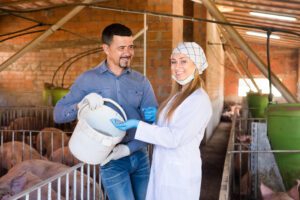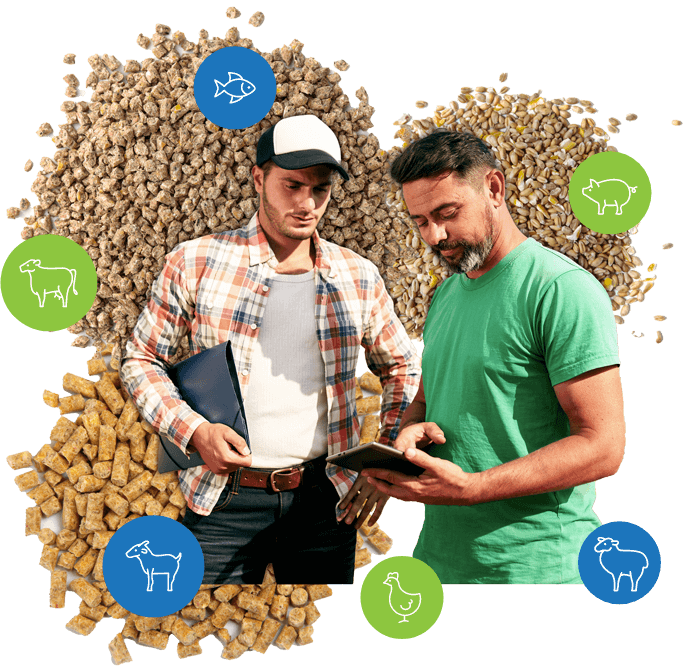The Animal Nutrition Association of Canada (ANAC) is pleased to offer the ANAC Graduate Scholarship. Eligible students (Canadian citizens and permanent residents of Canada) must be enrolled in a Canadian university graduate program in Animal Science or related field of study and have a specific interest (research project/course selection) in animal nutrition.

The ANAC Graduate Scholarship is made possible through funding by ANAC member companies. The intent of this annual national scholarship is to encourage students to consider pursuing a career in the feed industry.
In addition to the $4,000 award, the scholarship recipient will have the opportunity to present their research at the opening plenary of the Animal Nutrition Conference of Canada (ANCC). The ANCC is a dynamic conference that brings together researchers and feed industry specialists to exchange knowledge about the latest scientific developments related to livestock nutrition.
How to apply
Applications for the 2024 ANAC Graduate Scholarship are now closed.
To apply for the ANAC Graduate Scholarship, applicants must complete an online application package including following components:
- Resume
- Reference letter from the applicant’s academic advisor
- One-page cover letter outlining their project and how it contributes to the Canadian feed industry. Note: Commitment to attend the conference must be stated in the letter.
- Official transcript or list of completed courses signed by the applicant’s academic advisor. Additional consideration will be given to those that have a focus on nutrition related courses.
Detailed application information can be found in the document below.
For any questions concerning the Graduate Scholarship, please email info@anacan.org.
2023 ANAC Scholarship Recipient

The 2023 ANAC scholarship winner was Miranda Buchinski, Masters student at the University of Saskatchewan.
Miranda presented her recent research at the Animal Nutrition Conference of Canada. Read her abstract below:
The impact of dietary nitrogen content and source on essential amino acid utilization and growth performance in growing pigs
Low protein diets have improved nitrogen (N) utilization, but dietary N for the endogenous synthesis of non-essential amino acids (NEAA) may be limiting. Inclusion of a non-protein nitrogen (NPN) may improve utilization of essential amino acids (EAA). A N-balance study was conducted, where 90 growing barrows were assigned to 1 of 10 dietary treatments. Diets contained no ammonium phosphate (NAP; EAA-N:TN of 0.56) or were supplemented with 1.7% ammonium phosphate (AP; EAA-N:TN of 0.50) with graded levels of dietary Lys [0.8%, 0.9%, 1.0%, 1.1% and 1.2% standardized ileal digestible (SID)]. Nitrogen retention (NR) was optimized at 1.00% SID Lys (15.6 g/d NR; R2 = 0.68) in pigs fed NAP diets and 1.09% SID Lys (16.4 g/d NR; R2 = 0.61) in pigs fed AP diets. Overall, a diet deficient in N (EAA-N:TN of 0.56) reduced NR and Lys requirement, which were increased with NPN supplementation. A follow-up study was conducted, where 240 mixed-sex growing pigs were housed in groups of 5 pigs/pen. Pens were assigned to 1 of 6 dietary treatments for 28 d. The same NAP and AP diets were used with graded Lys at 1.03%, 1.15% or 1.27% SID. Average daily gain and final body weight were maintained, feed intake reduced, and feed efficiency increased with AP inclusion. Greater lysine increased average daily gain and final body weight. Lean depth was increased in AP-fed pigs. Overall, including supplemental N, as NPN, can improve lean gain and feed efficiency while maintaining overall growth performance in growing pigs.
Past Scholarship Winners
ANAC National Scholarship
2023: Miranda Buchinski, University of Saskatchewan
2022: Amanda J. Fischer-Tlustos, Univerisity of Guelph
2021: Melissa Williams, University of Guelph
2020: Liam Kelln, University of Saskatchewan
2019: Casey Havekes, University of Guelph
2018: Victoria Seip, University of Guelph
2017: Haley Leung, University of Guelph
Eastern Scholarship
2016: Heather Reinhardt, University of Guelph
2015: Melissa Wiseman, University of Guelph
2014: Elizabeth Ellis, University of Guelph
2013: Emily Miller, University of Guelph
2012: Natalie Litvak, University of Guelph
2011: Jaclyn Elyse Love, University of Guelph
2010: Hector R. Martinez Ramirez, University of Guelph
2009: Daniel Columbus, University of Guelph
2008: Katie Wood, University of Guelph
Western Scholarship
2016: Sasha van der Klein, University of Alberta
2015: Janna Moats, University of Saskatchewan
2014: Faustin Joy, University of Saskatchewan
2013: Megan DeVisser, University of Saskatchewan
2012: Aman Deep, University of Saskatchewan
2011: Matthew Walpole, University of Saskatchewan
2010: Prajwal Regmi, University of Alberta
2009: Amanda Van De Kerckhove, University of Saskatchewan
2008: Kristopher Wierenga, University of Alberta
2007: Thomas Nortey, University of Saskatchewan

